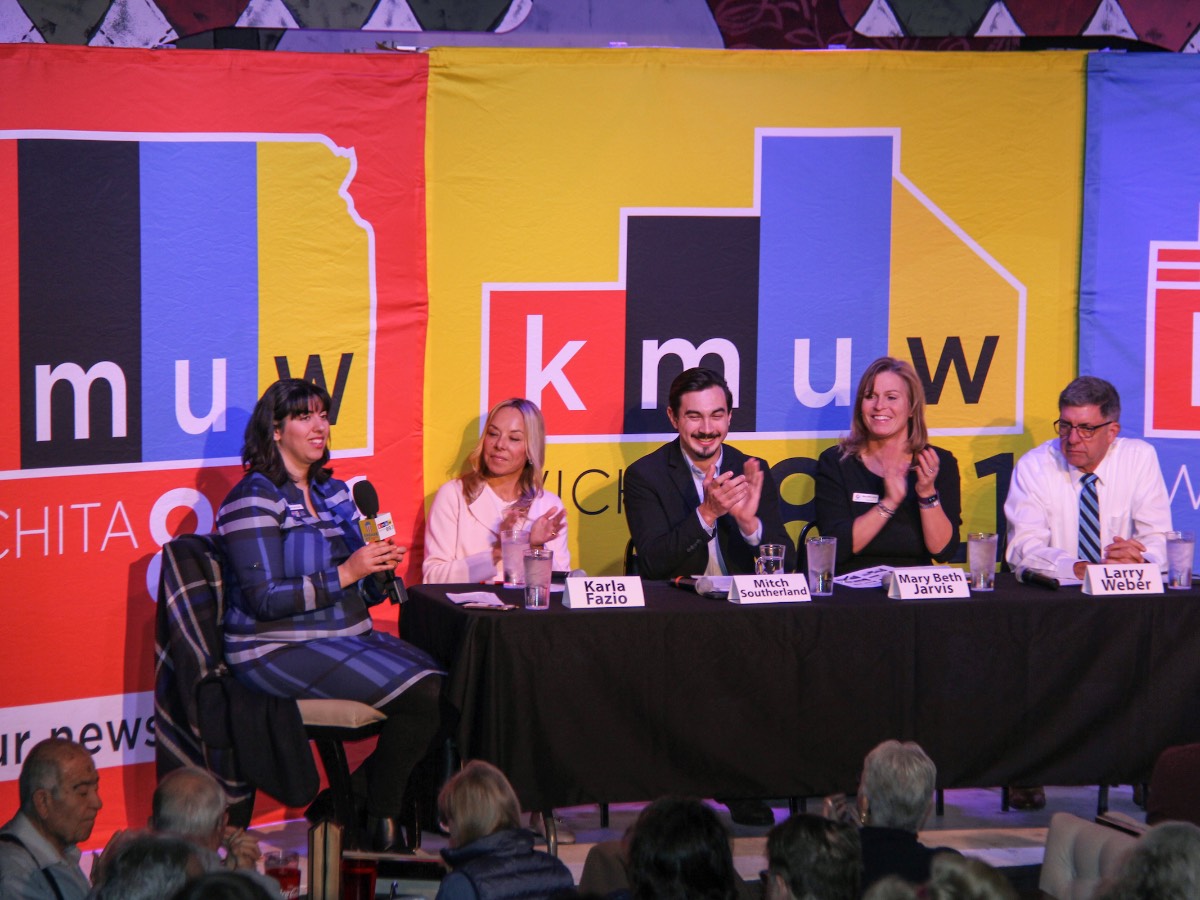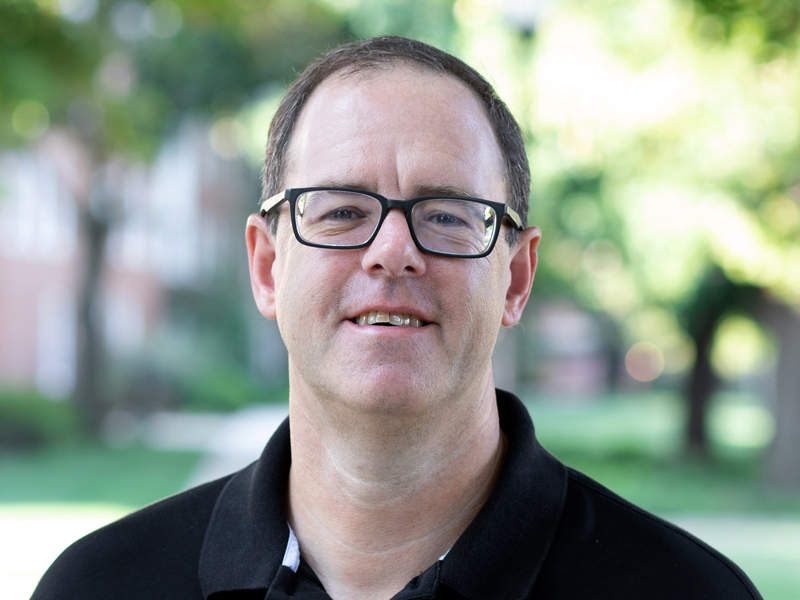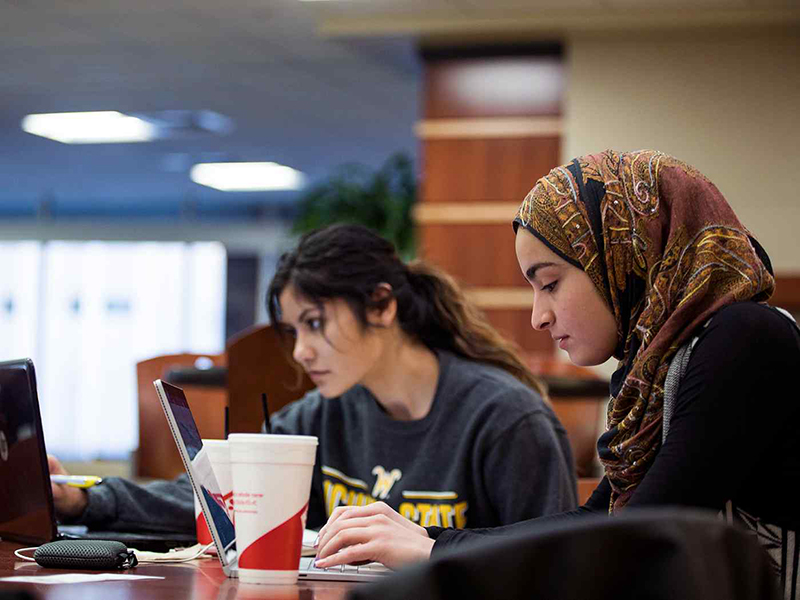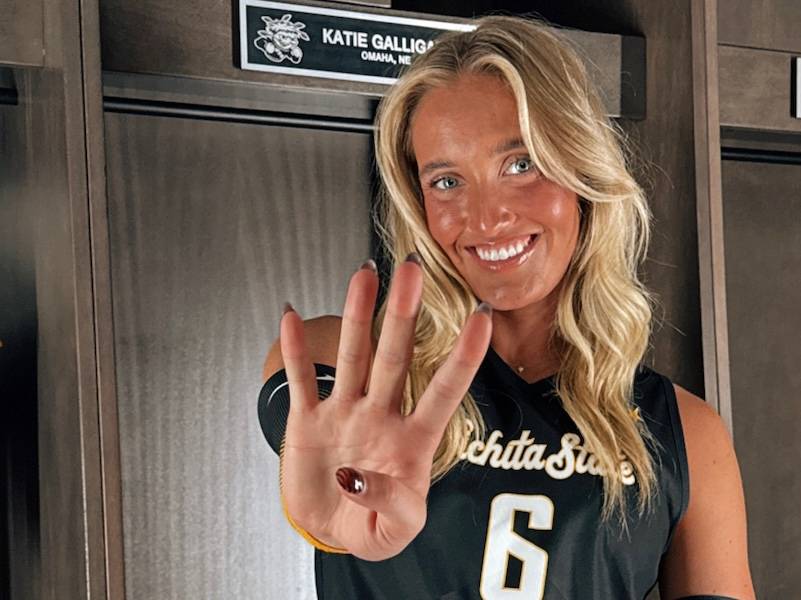The Old Town home of KMUW (89.1 FM) is the visible sign of the station’s new life – in place to engage with its neighbors, full of reporters and decorated with local art.
The same goes for its on-air, on-line and in-person content. KMUW is building the resources and reputation to dive into Wichita and Kansas and use the world of public radio to deliver those messages.
“The stories of Wichita are going to get out now that are good stories, good things about Wichita can be told now that we’ve established our self as a trusted source on a national and international level,” said Debra Fraser, KMUW general manager. “We had to get there, though.”
That took fund-raising, event-planning, hiring and reporting. It took evaluating KMUW’s strengths and weaknesses and how it needed to serve the community.
Four years after arriving in Wichita, Fraser is happy with KMUW’s growth and planning for more.
“I know the impact and influence that can come from a public radio station that focuses on community service,” she said. “We’re trying to grow, as many traditional media outlets shrink resources.”
Earlier this month, almost 200 people packed Roxy’s Downtown for the December edition of Engage ICT: Democracy on Tap for a look at Century II and the future of fine arts downtown.
Wichita’s discussion on the future of Century II is a story about community interaction and a news story and a story about Wichita’s direction at what many see as pivotal time.
This is the type of story built for KMUW and its growing mission to deliver news and link with the community.
These are the discussions that Fraser envisioned when she came to Wichita and Wichita State University, lured by an opportunity in a city she compares to Austin, Texas in the beginnings of its boom. This is why KMUW bulked up its local news resources, boosted its fund-raising efforts and invited listeners to become more a part of the conversation in recent years through panel discussions, election debates and arts and music events.
Sarah Jane Crespo, director of community engagement, moderated the four-person panel discussion on Century II, which opened in 1969. The panelists – Mary Beth Jarvis, Larry Weber and Karla Fazio of the Century II Citizens Advisory Committee and Music Theatre Wichita production manager Mitch Southerland – explained the issues with the building and options for renovation or rebuild. They took questions from Crespo and written questions from the audience.
“This place has been MacGyvered more than a ’76 Pinto,” Jarvis said. “It was incredibly forward-looking at the time.”
 Paul Suellentrop
Paul Suellentrop
The Engage ICT series, started in 2016, took on social media activism in November, political philosophy in October and education over three nights in the late summer and early fall. Crespo, in her eighth year at KMUW, calls the series the best example of KMUW’s growth in connecting with the community.
“There’s just so much to talk about and so much to cover and this does that in a way that’s different from the news,” she said. “How we can have conversations? How we answer people’s questions? How we can address topics that are maybe national topics, but address them locally or highlight the way they reach back to us locally?”
Fraser, who came to Wichita from the University of Houston’s Houston Public Media, set adding to KMUW’s news offerings and engaging with its listeners as her top goals. She loved KMUW’s 2016 move to Old Town and wanted the station to participate in the cultural scene that surrounds the offices at 121 N. Mead.
“It’s a very artistic community, a really creative community and the businesses were just starting to recognize how entrepreneurship actually connected with art,” Fraser said. “I got to see that through outside eyes when I got here. I said right away what I wanted our mission to be was for KMUW to tell the story of Wichita to Wichita and then tell that story to the world.”
KMUW filled its second-floor Old Town offices with bright furniture, an old-school KMUW sign and a garage door that opens to give the lobby space for gatherings. It is a mix of cool and functional – the bathroom is within 20 feet of the control room and a sign radio people helped with the plans.
“We can’t put ‘Bohemian Rhapsody’ on,” Fraser said. “We do not have ‘Stairway to Heaven’ to use. And I knew not to put the toilet on the wall against the studio.”
She knew fund-raising needed to grow to make those moves possible. She started a monthly donor program and improved retention of donors. Fund-raising grew by around $250,000 in the past two years, she said.
“One of our themes during our pledge drive was – we’re trying to enhance our news coverage,” said Tom Shine, director of news and public affairs. “People who listen to KMUW and NPR, in general, consume news at a pretty high rate. They want local news. And they want national news, too. And they’re willing to pay for it. We couldn’t do it without them – it’s as simple as that.”
Shine started at KMUW in 2017 after 37 years as a reporter and editor at The Wichita Eagle. Fraser wanted his experience and reputation to serve as some as a finishing touch on the station’s expanded local news. Fraser knew he knew the community and knew how to lead a staff. She figured he could learn radio.
“We needed a newsperson,” Fraser said. “We needed somebody who had a news mind, knew the whole picture, knew the community.”
KMUW’s local newscasts grew from five to seven to 10 daily in the past year. The staff of full-time reporters grew from three in 2014 to six, which doesn’t include reporters from the Kansas News Services. Fraser and Shine started an internship with Wichita State’s Elliott School of Communication with two students working 15 hours a week each semester.
“(Fraser) has a news background – she gets what we do,” said Carla Eckels, director of cultural diversity for news and engagement. “That’s our nucleus. People appreciate that we’ve added more newscasts. They feel a sense of ownership – ‘That’s my station.’ They invest in it. They want it to grow.”
Those resources improved KMUW’s national reputation, Fraser said, another part of her strategy to increase its heft. When reporter Brian Grimmett does a story on oil production in Kansas that is picked up by American Public Media’s Marketplace, it is good for KMUW and good for Wichita. NPR also used KMUW reporters to contribute stories on immigration politics in Kansas elections and the swatting incident in Wichita.
This work, Fraser said, tells NPR that KMUW reporters can produce national stories, which makes NPR more likely to lean on them for stories about Wichita and Kansas. Whether it’s breaking news or a feature story or a trend story, KMUW now employs a staff that NPR trusts. Over the next two years, KMUW will collaborate with NPR’s 1A Across America to report on community issues, another way to bring Wichita and Kansas national attention.
Eckels, a 21-year employee at KMUW, did a story about a new book on Emmett Till – the black teenager murdered in Mississippi in 1955 – in August. A text from a former Wichitan who lives in Seattle complimented her for the story.
“She said ‘I almost had a wreck when I heard your voice,” Eckels said. “You love it people can hear you all over the country. That’s happening more and more. We’re getting people on Marketplace, on Here and Now.”
KMUW’s growth also fits with its mission connected with Wichita State.
“We want to make people smarter,” Fraser said. “We want to help people make better choices. We want to help make Wichita even better. You could take all of those statements and apply them to Wichita State University. That’s what makes us such a reliable arm of the university.”
Fraser’s vision extends beyond more reporters, more news and community discussion. She wants KMUW to give Wichita its own version of 1A, the daily NPR discussion show, hosted by Joshua Johnson from Washington, D.C.
“We’d like to represent Wichita as well as 1A represents America,” Fraser said. “It’s going to cost money. It’s going to cost more money than we presently have. We have to figure out how to fund that. Joshua Johnson and his strategy, his philosophy has gone over so well, that I kind want to copy it.”






